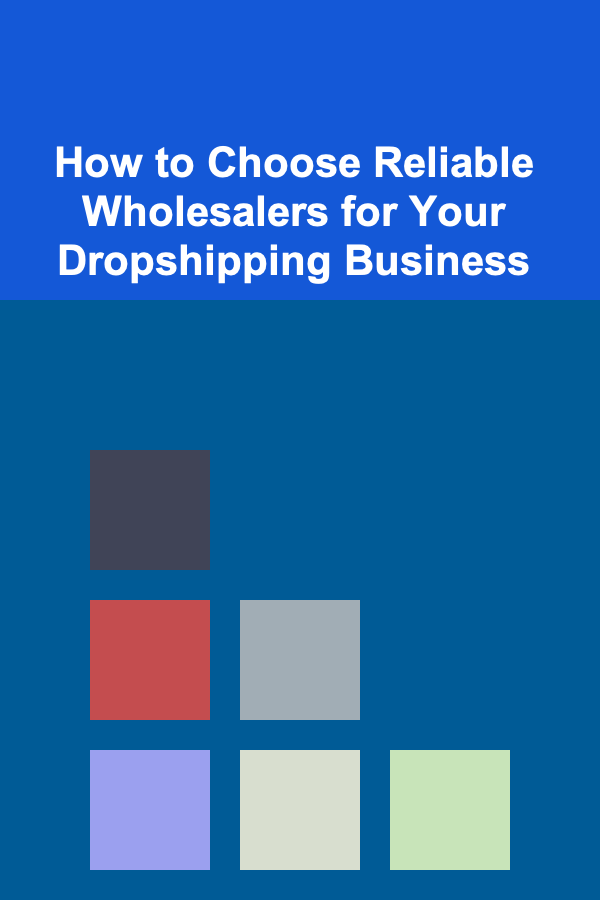
How to Choose Reliable Wholesalers for Your Dropshipping Business
ebook include PDF & Audio bundle (Micro Guide)
$12.99$5.99
Limited Time Offer! Order within the next:

One of the most crucial decisions when starting a dropshipping business is choosing reliable wholesalers. Your relationship with your wholesaler can make or break your business, as they directly impact your product quality, inventory management, shipping times, and overall customer experience. A solid wholesaler can provide the backbone you need to scale your business, while a bad one can lead to lost customers, poor reviews, and financial setbacks.
This guide provides actionable steps and insights into selecting a trustworthy wholesaler for your dropshipping venture. Whether you are just starting out or looking to optimize your existing business, these strategies will help you build long-term, mutually beneficial relationships with suppliers who are committed to helping your business grow.
Research Potential Wholesalers
When selecting a wholesaler for your dropshipping business, the first step is to thoroughly research potential suppliers. This process involves understanding the nature of the supplier, their offerings, and how they match your product and market niche.
How to Research Wholesalers:
- Use Online Directories: Platforms like SaleHoo, Doba, and Worldwide Brands offer a curated list of verified wholesalers, making it easier for you to find reputable suppliers.
- Look for Specialization: Choose wholesalers who specialize in the types of products you plan to sell. Specialized wholesalers often provide better quality and a more comprehensive range of products within your niche.
- Check Their Reputation: Look for online reviews, testimonials, and case studies about the wholesaler. Websites like Trustpilot or forums like Reddit and Quora can provide feedback from other dropshippers who have worked with the supplier.
Verify Their Legitimacy
A reliable wholesaler will have established credibility, which is vital for the smooth operation of your business. Dealing with unreliable or even fraudulent suppliers can lead to issues such as counterfeit products, missed shipments, or inventory shortages.
How to Verify Legitimacy:
- Check Business Credentials: Verify that the wholesaler has a legitimate business license and operates under valid legal regulations. This information is often available on their website or upon request.
- Request References: A trustworthy wholesaler should be willing to provide references from other businesses they've worked with. Reach out to these references to get firsthand feedback.
- Look for Secure Websites: If you're communicating or transacting online, ensure the wholesaler's website uses SSL encryption (check for the "https://" in the URL). This helps ensure that your business and payment details are secure.
Evaluate Product Quality
The quality of the products you sell directly influences your customer satisfaction, brand reputation, and the likelihood of repeat sales. It's crucial to test and assess the quality of your wholesaler's products before committing to a long-term relationship.
How to Evaluate Product Quality:
- Request Samples: Always ask for product samples before placing large orders. This allows you to inspect the quality, packaging, and overall look and feel of the items you will be selling to your customers.
- Assess Product Range and Variety: A wholesaler who offers a wide range of products within your niche can help you scale your business and experiment with different products to see what sells best.
- Review Manufacturer Details: Check who the actual manufacturer is and research their reputation. Wholesalers often source products from manufacturers abroad, and understanding the production process is key to ensuring quality control.
Consider Shipping Times and Costs
Shipping is a significant factor in dropshipping, as it directly affects customer satisfaction. Slow shipping times or unexpected costs can lead to customer complaints and refunds. The wholesaler you choose must have reliable and timely shipping options.
How to Consider Shipping Times and Costs:
- Check Shipping Policies: Review the wholesaler's shipping options, costs, and delivery times. Ensure that these align with your customers' expectations and your business model.
- Ask About Tracking: Make sure the wholesaler provides tracking information for every order. This helps customers feel confident in their purchase and reduces the number of inquiries you'll receive regarding the status of their shipments.
- Test Their Shipping: If possible, order a test shipment to evaluate delivery times and overall service. This will help you understand what your customers will experience when they place an order through your store.
Assess Their Customer Service
Your wholesaler's customer service plays a critical role in resolving issues that arise with orders, returns, or damaged products. A supplier with excellent customer support can be a valuable partner in ensuring smooth operations.
How to Assess Customer Service:
- Response Time: Test how quickly the wholesaler responds to inquiries. A good wholesaler should reply promptly to your questions, even during business hours.
- Support Channels: Ensure that the wholesaler offers multiple communication channels such as phone, email, and live chat. Having access to various support options can make resolving problems much easier.
- Ask About Return Policies: Understand the wholesaler's policy on damaged goods, returns, or defective products. A clear and fair return policy is essential to maintain your reputation with customers.
Understand Payment Terms
Understanding the payment structure is key to maintaining healthy cash flow and preventing financial strain. A trustworthy wholesaler will offer flexible, transparent payment terms that suit your business's needs.
How to Understand Payment Terms:
- Upfront Payment vs. Net Terms: Some wholesalers require full payment upfront, while others offer net terms (e.g., payment in 30, 60, or 90 days). Depending on your financial situation, net terms may be more beneficial, as they allow you to sell the products before paying for them.
- Look for Secure Payment Methods: Make sure the wholesaler offers secure, commonly used payment methods such as bank transfers, PayPal, or credit cards. Avoid suppliers who only accept untraceable payment methods like cryptocurrency or cash.
- Review Minimum Order Quantities: Some wholesalers may have minimum order requirements, even for dropshipping. Ensure these align with your sales projections to avoid unnecessary overstocking.
Test Their Reliability Over Time
Building a long-term business relationship with your wholesaler is crucial. It's important to test their reliability over time to ensure they can handle the growth of your dropshipping business.
How to Test Their Reliability:
- Start with Small Orders: Begin by placing smaller orders to assess how the wholesaler handles your business needs. Evaluate the consistency and reliability of their service before committing to larger volumes.
- Track Order Accuracy: Track whether the wholesaler consistently ships the correct products and quantities. Any errors here will reflect poorly on your business and lead to customer dissatisfaction.
- Evaluate Long-Term Service: Over time, assess how the wholesaler adapts to changing demands, especially if you scale your business. A good wholesaler should be able to meet the evolving needs of your growing business.
Ensure They Are Scalable
As your dropshipping business grows, you'll need a wholesaler who can keep up with the increased demand. Scalability is crucial to ensure that your wholesaler can handle the growing volume of orders and support your business as it expands.
How to Ensure Scalability:
- Capacity for Growth: Ask the wholesaler about their capacity to fulfill larger orders, especially during peak seasons like holidays. Can they maintain product availability when demand surges?
- Flexible Stock Levels: Ensure the wholesaler has the capability to scale up inventory as needed. Many dropshipping businesses face stockouts due to high demand, so finding a wholesaler who can keep up with your inventory needs is essential.
- Long-Term Partnership: Choose a wholesaler with the potential for a long-term partnership. This will allow you to build a relationship of trust and communication, which is crucial for navigating the ups and downs of business growth.
Compare Multiple Wholesalers
Don't settle on the first wholesaler you come across. Comparing multiple suppliers will give you insight into which one offers the best combination of pricing, quality, and service.
How to Compare Wholesalers:
- Price Comparison: Compare the wholesale prices of similar products from different suppliers. However, avoid choosing the cheapest option, as this may compromise quality.
- Evaluate Customer Feedback: Compare reviews from other dropshippers to see how different wholesalers perform. Look at customer service experiences, product quality, and reliability.
- Consider Terms and Conditions: Review the terms of service, shipping policies, and payment structures for multiple wholesalers. Choose the one that offers the most favorable terms for your business.
Conclusion
Choosing a reliable wholesaler is one of the most important decisions you'll make when building your dropshipping business. The right supplier will support your business growth, ensure product quality, and maintain customer satisfaction, while a bad wholesaler can lead to logistical nightmares and poor customer experiences.
By conducting thorough research, verifying legitimacy, assessing product quality, and ensuring scalability, you can form long-lasting partnerships with trustworthy wholesalers who will help you thrive in the competitive world of dropshipping. Make sure to continuously assess their performance and adapt as needed to ensure you have a reliable supply chain that grows with your business.

How To Enjoy Every Outdoor Adventure
Read More
How to Set Up a Display Case for Fragile Antiques
Read More
How to Stage a Small Home to Maximize Space and Appeal
Read More
How to Use Podcasting to Make Money
Read More
The Marketing Analyst's Guide: Leveraging Data to Drive Business Decisions
Read More
The Ultimate Guide to Budget-Friendly Gym Equipment Alternatives
Read MoreOther Products

How To Enjoy Every Outdoor Adventure
Read More
How to Set Up a Display Case for Fragile Antiques
Read More
How to Stage a Small Home to Maximize Space and Appeal
Read More
How to Use Podcasting to Make Money
Read More
The Marketing Analyst's Guide: Leveraging Data to Drive Business Decisions
Read More